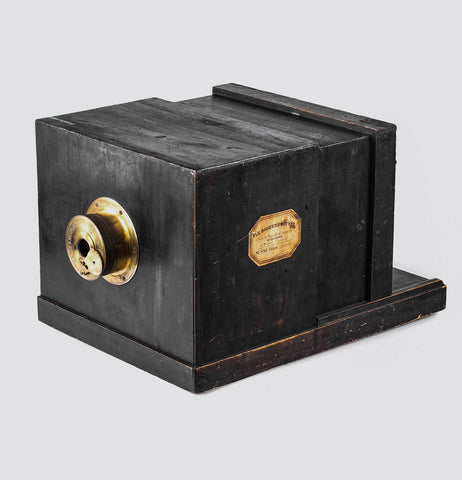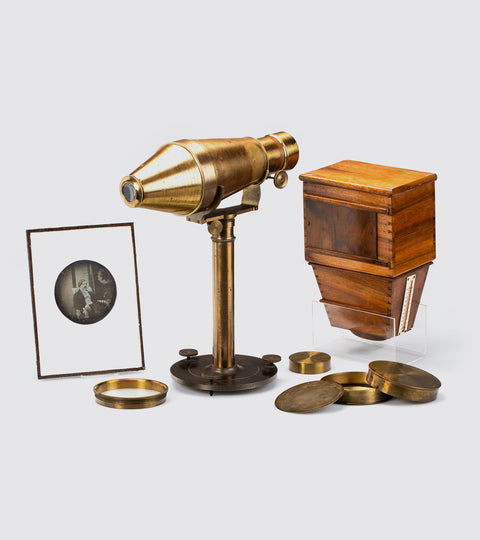Revolutionary invention in Vienna in 1840
On August 19, 1839, the invention of photography was introduced to the public in Paris. Just four days later, on August 23, an advertisement by Susse Frères appeared in the "Gazette de France" promoting the world's first commercially produced camera. The "Daguerreotype", built by the Susse brothers and equipped with a lens by Chevallier, corresponds in all details to the plans presented by Daguerre.

The only camera of this type still existing today is the highlight of the permanent exhibition at the WestLicht Photo and Camera Museum in Vienna. Shortly after the "Susse Frères" appeared, the Giroux "Daguerreotype" and subsequently other cameras for daguerreotypes came onto the market.
Generally, the invention and development of photography is attributed exclusively to pioneers from France and England. It is little known that photography was revolutionized just one year after its birth by an invention made in Austria. With the help of eleven assistants from the imperial artillery, the physics professor and mathematician Josef Maximilian Petzval succeeded in calculating a lens as fast as 1:3.7.



The first camera to be equipped with this lens was the "All-Metal Camera" manufactured by Voigtländer in Vienna. In a utopian design for the time, this all-brass, cannon-shaped camera was a sales success despite its high price (it was equivalent to the value of a good racehorse). It is estimated that about 600 of these cameras had been built by 1842. Less than ten of these devices have survived and are all in state museums.
We are all the more pleased that the private WestLicht Museum can now permanently display one of these rarities from the pioneering days of photography in its collection. Not only the camera itself is on display in the showcase, but also the original mercury box (of which only one other is known worldwide), accessories, an instruction manual from 1841, and also daguerreotypes in the characteristic circular format. One of these rare photographs shows a portrait of Maximilian of Bavaria from 1841, the father of the later Empress Sisi.

Peter Coeln
Photographs courtesy WestLicht. Museum for Photography


6 Comments
Vielen Dank für die hilfreichen Informationen.
I have seem dozens of images of this over the years in all teh standard texts but never any indication of size…I really don’t know whether it’s the size of a cannon (unlikely!) or a thimble…equally unlikely.) Does anyone know of an image where there’s a hand, a coin, a cigarette lighter or a racehorse (!) to satisfy my curiosity?
Thanks!
Guten Tag,
Ich bin in Besitz einer Solche Kamera in Sehr gute Erhaltung.
Bitte um Auskunft und Mögliches Wertes einen Gerät.
Vielen Dank Piero Balbusso
I did not know aout many things till I read this message. I have a camera dating back to 1880 made by Dallmeyer.
Revolutionary invention in Vienna in 1840 | Coeln Cameras Blog – Vintage Cameras & Lenses | Coeln Cameras
[url=http://www.gp1idq9hu12h219yj5o170651eau64zls.org/]ukbmikfplg[/url]
akbmikfplg
kbmikfplg http://www.gp1idq9hu12h219yj5o170651eau64zls.org/
Excellent texte .